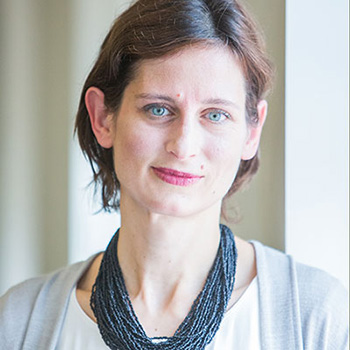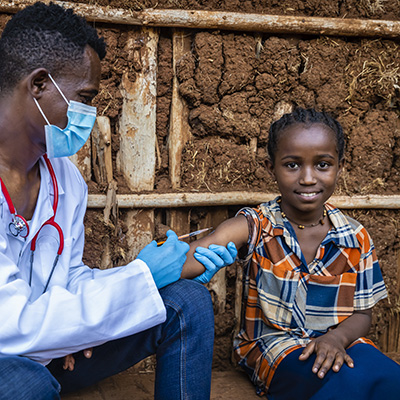Published: July 22, 2022

There is not a single country in the world that is not touched by human trafficking. Let that sink in. The number of people victimized by human slavery across the globe is currently greater than the populations of London, New York and Los Angeles combined. This is not a problem affecting people on the other side of the world, it’s one here at home, very likely in our own communities. One that will require collaboration and diverse and innovative approaches to combat.
Joining me today is Renata Konrad, professor of industrial engineering at Worcester Polytechnic Institute, who is using her background and experience to explore the role that engineering can play in combatting the complex and growing challenges involved in combatting human trafficking.
I think the statistic that most sticks in my mind, which speaks to the pervasiveness of the problem, is that the average hipster employs 27 slaves each day, and this was actually the title of an article in The Huffington Post in 2015. This statistically speaks to me because it states the coffee I drink could have been picked by children being trafficked or exploited, the t-shirt I wear could have been made in a sweatshop, the bikes my children ride could have also been made in a factory somewhere under exploitive conditions. So that statistic really speaks to me that this is just a global, pervasive problem that is just ingrained in our supply chains.
Interviewed this episode:

Renata Konrad
Worcester Polytechnic Institute
Renata Konrad is an associate professor of industrial engineering at Worcester Polytechnic Institute. Dr. Konrad’s research focuses on the application of operations research methodologies to social justice issues and healthcare to improve the quality, timeliness, and efficiency of operations. This research includes using optimization and simulation to inform human trafficking awareness campaigns, to locate housing, to understand the relationship between illegal fishing and exploited labor, and to improve access to primary care. Dr. Konrad’s research is funded by the U.S. National Science Foundation (NSF) and was featured in the 2019 United Nations Report of the Special Rapporteur on Contemporary Forms of Slavery. She has served on the U.S. Department of Transportation Advisory Committee on Human Trafficking and on the U.S. Department of Homeland Security – Science and Technology, Human Trafficking Advisory Committee, and in January 2022 returned from Ukraine where she was on a Fulbright Award. She is a recipient of the Romeo L. Moruzzi Young Faculty Award for innovative teaching. Dr. Konrad earned a Ph.D. in Industrial Engineering from Purdue University, and her masters degree from the University in Toronto.
Related Episodes
Episode Transcript
Ashley Kilgore:
There is not a single country in the world that is not touched by human trafficking. Let that sink in. The number of people victimized by human slavery across the globe is currently greater than the populations of London, New York and Los Angeles combined. This is not a problem affecting people on the other side of the world, it’s one right here at home, very likely in our own communities. One that will require collaboration and diverse and innovative approaches to combat. Joining me today is Renata Konrad, professor of industrial engineering at Worcester Polytechnic Institute. Who’s using her background and experience to explore the role that engineering can play in combating the complex and growing challenges involved in combating human trafficking.
Ashley Kilgore:
Renata, thank you so much for joining me to share your unique perspective on this global issue. Before we jump into discussing your work, could you help paint the picture of the magnitude of human trafficking, so our listeners can fully grasp just how prevalent it is and how many people it impacts. I touched on this in my opening, but would love to hear the perspective of someone directly involved in work to combat human trafficking.
Renata Konrad:
Thank you. And it’s terrific to be here. And before I jump into defining the magnitude, I want to take a second to provide a definition of human trafficking. It is the exploitation of another human, it’s using force, fraud, or coercion against another individual to get him or her to work in a situation against their will. It could take on the form of labor trafficking. So, domestic work, could be in agriculture, it could be in fishing, could be forced begging, or could be sex trafficking. And that’s what most people, when they think of the term human trafficking, they think of sex trafficking. But I do want to make the distinction that there is labor trafficking, there’s sex trafficking, and the definition of human trafficking is exploiting another individual for commercial purposes. But the magnitude, as you mentioned, is mind staggering really.
Renata Konrad:
There’s some statistics that say the volume of human trafficking is second or third to the sale of illegal drugs and illegal weapons. The international labor organization, estimates that trafficking generates a $150 billion annually in illicit, illegal profit. I think the statistic that most sticks in my mind, which speaks to the pervasiveness of the problem is that the average hipster employs 27 slaves each day. And this was actually the title of an article in the Huffington Post in, I think 2015. And to me, this statistic really speaks to me because it states that the coffee I drink could have been picked by children being trafficked, or exploited. The t-shirt that I wear could have been made in a sweat shop. It’s the bikes my children ride could have been also made in a factory somewhere under exploitive conditions. So, that statistic really speaks to me that this is just a global pervasive problem that’s ingrained in our supply chains.
Renata Konrad:
The International Labor Organization estimates that at any given time, 25 million people are estimated to be trafficked, at the same time there’s enormous gaps between the estimated number of people who are being trafficked and the number of people that are identified, the traffickers that are prosecuted and convicted. So, just to give you an example, again, the International Labor Organization estimates that about, and this is a conservative estimate, that 25 million people are trafficked annually in 2020, there are about 10,000 prosecutions of which there were about a thousand convictions and only a hundred thousand people were identified as being trafficked. So just enormous gaps between the number of people that are estimated to be trafficked and the number of people that are identified and then prosecuted and convicted.
Ashley Kilgore:
Renata, those are really staggering statistics. What are some of the reasons human trafficking is such a difficult problem to combat?
Renata Konrad:
So many reasons. So, first of all, I think, as I mentioned earlier, trafficking is just very much ingrained in global markets, in our economic markets there’s insatiable demand for cheap goods and services, whether it’s your inexpensive t-shirt, your lawn care, childcare, house care, wherever there’s vulnerability, people made vulnerable either by war, by natural disaster, economic situations, people are at risk of being exploited. So there’s almost this unending “supply of vulnerable people” who are at extreme risk of exploitation, saying that it’s difficult to combat this problem, because for one reason, this is a hidden population. The term hidden in plain sight is often used, trafficking does exist within a legal environment. So, for example, in our agricultural supply chains, buying tomatoes is a legal product, but how those tomatoes are picked for earlier in the supply chain could be the result of exploitive situations.
Renata Konrad:
These people who are trafficked, these individuals may not realize that they’re being trafficked. They may be ashamed to come forward. They may not be able to come forward. Typically they have limited social interaction. There’s many barriers to disclosing trafficking, and someone might not self-identify as being trafficked. A second reason why trafficking is difficult to combat is that these networks are hidden. So trafficking is illegal and pretty much every country in the world, traffickers and exploiters are dynamic. They can change their tactics very quickly. They’re trying to hide their activities, which they know are illegal. So, that’s another reason why trafficking is difficult to combat.
Renata Konrad:
The third reason is data’s very fragmented. There’s little reliable data that could be missing, it could be inaccurate, it could be false. Typically data, especially for prosecutions, is needed from multiple sources, often multiple jurisdictions. It’s difficult to bring this data together. It’s difficult to get the data to identify, to find a victim, a potential victim, or an individual. It’s difficult to bring together the data, to make a case against a trafficker. Data is fragmented and not always reliable.
Renata Konrad:
And finally, a fourth reason why combining this problem is so difficult. And I think this is where operations research plays a significant role, is there’s very limited resources in anti-trafficking work and the resources available for anti-trafficking operations is very much disproportionate to the scale of the problem. There’s a number of estimates about how much money is needed to eradicate trafficking. How much is appropriated compared to drug trafficking versus human trafficking? One study puts out that there’s an estimated 13.5 billion US dollars is needed to eradicate trafficking worldwide, but at the same time, the scale of spending is minuscule compared to that. And this is where I think operations research really, really has a strong advantage to come in and address the problem.
Ashley Kilgore:
So now, traditionally, what have been some of the methods used in trying to gain insight into these complexities in order to combat human trafficking?
Renata Konrad:
So conventionally anti-trafficking is characterized by the four P approach, which stands for prevention, protection, prosecution, and then partnership. So conventionally anti-trafficking has been, I’d say very siloed, there’s law enforcement which very much works on identifying… They do victim identification, but really on finding the traffickers, prosecuting the traffickers, convicting the traffickers. There are a number of NGOs and government agencies working on prevention side. So, anti-trafficking awareness campaigns are very prominent anti-trafficking activity, but I would say conventionally, it’s been law enforcement focusing on the almost a reactive side to illegal activities and then more so social scientists and psychologists and healthcare side focusing on the prevention aspect of human trafficking.
Ashley Kilgore:
So Renata, how did you personally come to be involved in this type of research?
Renata Konrad:
So this is the somewhat longer and personal story, but when I finished my master’s degree in industrial engineering, I volunteered with an organization called Help us Help the Children in Ukraine. This was about 20 years ago. And the organization worked with children in state run orphanages, or institutions. And there, I met a girl who, she was about to age out of the system. And 20 years ago, these children were left a lot to their own devices. And she approached me asking me about a letter she received from a man in Florida asking her to come live with him in Florida, and she’ll get to go swimming in a pool and go to Disney. And she was asking my opinion. And at the time I didn’t know what human trafficking was, but something about the situation didn’t seem right to me.
Renata Konrad:
And that conversation just always stuck in my mind. And throughout the years, I began hearing this term human trafficking and what it is, and I just really kept thinking about this girl and what happened to her and others like her. And several years ago, it was a couple of water cooler conversations that it began thinking through, what is the role that operations research, what is the role that engineering can play in this area? We have such a long history as a community of making systems better, making healthcare systems better, more efficient, more effective, more productive. What about thinking, how can we make anti-human trafficking operations? How can we improve anti-trafficking operations? And that’s how, I guess I got started in this line of research.
Ashley Kilgore:
So now I’d love to dive more deeply into your own work. How can engineering provide a unique approach to addressing the challenges associated with human trafficking that we’ve discussed so far?
Renata Konrad:
So I think there’s many, many, many different ways. I almost want to say it’s unlimited. As I mentioned, I think operations research and engineering has so much to offer in this field. Before I specify how I think engineering and operations research can help, I want to say that there has been very recently, much more work being done by statisticians and data scientists, and these are very active fields. And operation research and analytics and engineering is emerging and gaining momentum in the appreciation of what it can offer. And I think there’s many different ways, I’ll list a few of them, but I would encourage listeners to read about, or listen about investigate what human trafficking is and think about their own toolkit and see where they can help. But just a few examples. One, I think is prevention, awareness campaigns.
Renata Konrad:
This is where NGOs spent a significant amount of money, maybe in New York City, you’ll see these in… Sorry, I’m using New York City as an example, but many cities across the United States, across the world have these kind of awareness signs of, if you see signs of human trafficking, call this, all over the world, they’ll have, NGOs are running campaigns of safe migration. As I alluded to before, human trafficking is very much intertwined with vulnerability, many people migrate in search of better economic opportunity. They don’t actually have to move, they can just look within their own city try and take a better… Trying to improve their own economic situation. And traffickers know this and exploit them.
Renata Konrad:
And many NGOs run these awareness campaigns of what is safe work? What is just work? What is fair work? But at the same time, an extraordinary amount of money is being spent on this. And I believe operations research can help inform how to effectively allocate these resources. Another area where I think engineering can address some of these challenges is using social network analysis. So recruitment of potential victims. Individuals fall into these exploitive situations and they were typically recruited. And understanding how people are recruited, typically these are through personal connections, or social networks and understanding what these networks look like. So I think that’s one role. That’s another area where engineering can provide insight.
Renata Konrad:
And I would say there’s been a significant work and in interdiction models, or has developed many methods, or a number of methods I should say to look at interdiction of illicit networks, specifically in drug trafficking. There is research and models being developed for interdiction models of human trafficking. So, how to disrupt and the planning and the coordination of these trafficking networks. And I do want to take a second to say that human trafficking does not necessarily involve the movement of humans. Trafficking network could be within one neighborhood, it could be within like a school district. It could be within a village, or a city. It doesn’t necessarily involve the stereotypical transporting people across borders. But again, I think network interdiction models is a third area where engineering can provide insight.
Renata Konrad:
As I mentioned, data science, there’s been many advances in data science applications, looking at primarily identifying potential victims of human trafficking. I think operations research and some of the algorithms that are being developed, specifically around the area of data fusion, maybe detecting false data, how to efficiently merge extreme gas data sets. That’s a fourth area where engineering can play a role. Game theory is a fifth area. Anti-human trafficking operations are very multi-disciplinary. So, there could be multiple government agencies involved, there could be an NGO, or several NGOs and law enforcement working together.
Renata Konrad:
There’s also the traffickers themselves and who has what data and how are they sharing data and trying to use this data against an adversary. Some more traditional OR, or operations research techniques that I think are applicable are scheduling. So again, extremely limited resources in anti-trafficking work. So things like how to schedule auditors for agriculture or how to schedule auditors for manufacturing, especially apparel manufacturing. I think Bangladesh has something like, I want to say 80 million factory employees, but only 90 auditors. And how do you schedule those auditors to be able to visit these factories in the most cost effective manner? And then I think the big question for… The big value that operations research brings is how do you effectively distribute very limited funds amongst anti-trafficking activities?
Ashley Kilgore:
So now, could you share, what are some of your current ongoing projects?
Renata Konrad:
Sure. So I’d like to share three with you. The first one I’d like to speak about is using systems dynamics in policy valuation. And specifically, I want to talk about the fishing industry and looking at anti-trafficking interventions in this industry. And fishing is, or I should say a seafood, the demand for seafood, inexpensive seafood is huge. It just completely has outpaced fish population growth. And as there’s this insatiable demand for inexpensive seafood and fisheries are required, or not required, but they go further, further out to sea to catch fish because the stock of fish close to the shore has been overfished and depleted.
Renata Konrad:
There’s very ineffective management, and typically unregulated fisheries around the globe. And at the same time, there’s extraordinary economic pressure to keep costs down. So ships are required to go further on to sea. When they go further on to sea, they may need to spend more on fuel. The only place where they can cut costs is labor. So the labor expectation is very well documented within seafood supply chains. Individuals are deceived with promises of employment, but they end up going on these ships for months at a time, sometimes working 20 hours a day, seven days a week, little or no pay documents are withheld. Labor trafficking in the fishing industry is very difficult to detect, and it’s also difficult to enforce. So one thing, so my co-authors and I did was we built a systems dynamics model looking at this issue, and we recognize that there’s this interdependence of environmental sustainability with the fish stocks. There’s also an economic market with demand for seafood. There is this interplay between labor that is legally employed and labor that is illegally employed as in being trafficked.
Renata Konrad:
So systems dynamics was very applicable in this sense, because there’s this amplification of behavior. So if fuel costs go up in one area, the price of fish goes up and so on. So we built this game where policy makers can look at, right now we have seven different anti-trafficking interventions and how that impacts industry profits, how that impacts the number of people being trafficked, how that impacts number of fishing vessels and so on. So, that is one project that I’ve been working on. A second project which I’ve mentioned before, where I think operations research has a role to play is in designing awareness campaigns.
Renata Konrad:
And in anti-trafficking work, awareness campaigns are a primary means of preventions. So you’ll see them in hotels and airports, many places. And a significant amount of money is being spent on these kind of billboards, or messages and social media messages, in television and on radio, just making people aware of what are some of the risks of either traveling for work, or what to do if you are in an exploitive situation, but how do you best allocate limited amount of funds to increase trafficking awareness?
Renata Konrad:
And this was… So I used linear programming. I realized that this type of modeling has been used very successfully in things like HIV awareness, in public health campaigns. And can we use that knowledge that the OR community has developed in the anti-trafficking sense? So, I built a linear programming model that was, the goal was really to provide an evidence based for NGOs to help best distribute their funds into different media, to increase trafficking awareness for vulnerable individuals. And what was really interesting to me about this work, well, not interesting, but it was interesting and challenging. And this remains a challenge in working trafficking world is unlike in healthcare, where if you use an intervention like a particular treatment or a particular drug, you know there are clinical studies that documents efficacy.
Renata Konrad:
In human trafficking this is next to impossible to capture because of the human behavioral aspect, did a person listen to a campaign and were they eventually trafficked or not? So, that was a big challenge in this work. A third example I want to provide is looking… It’s around shelter services and acknowledging that human trafficking is a product of social environment, that it’s people are made vulnerable for a variety of reasons and homelessness or lack of stable housing it’s a significant factor of increasing an individual’s vulnerability to exploitation. So this is one particular… The project I’d like to speak about is being done with New York City. And it’s understanding… The goal of the project is to improve access to housing supportive services in an effort to reduce “supply” of potential human attracting victims.
Renata Konrad:
And it’s a multi-prong project for the first part of it is we’re doing extensive data collection to understand what services and capacities exist in programs in the city, we’re going to estimate the prevalence of the runway homeless population for youth, because these, again, this is the population that’s most vulnerable to trafficking. And we want to estimate, again through surveying the needs of services and housing needs for youth. And then we’re using an integer linear programming model to project the required capacity to meet the needs of the Runway Homeless Youth, and then use optimization methods to project how to best deploy the needed capacity for the city.
Renata Konrad:
Why I wanted to speak about this project is it acknowledges that human trafficking is a larger social issue that it stems from individuals vulnerability. When there’s vulnerability involved, if we can reduce that vulnerability, we can reduce the risk of human trafficking.
Ashley Kilgore:
Renata, thank you again so much for joining me. Before we go, what do you hope resonated most with our listeners about this complex global issue we discussed today?
Renata Konrad:
So what I hope resonated the most is that as an OR, and analytics community, that we have the toolkit, we have the track record, I want to say, and the ability to address a very complex social problem. I also want to stress that this needs to be done… This is an emerging area and to establish credibility in this area, we need to move responsibly, we need to acknowledge, have a survivor and a victim centric approach. We need to include multiple stakeholders from criminology, sociology, psychology, healthcare, law enforcement, economics to really deliver responsible solutions.



